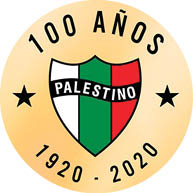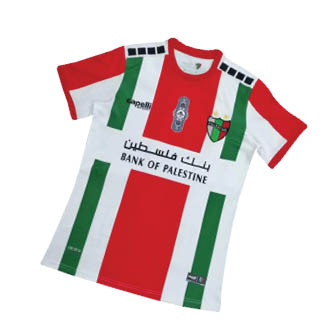Although the official founding date of Club Deportivo Palestino is August 20, 1920, the initial idea came up after the March 1916 Olympic Games that were held in Osorno, when the “free, loyal, hardworking, and healthy” Palestinian Sports Club was founded under the slogan Mens sana in corpore sano (a healthy mind in a healthy body). Initially, the club could boast of its outstanding tennis and football teams, and its members were exclusively of Palestinian origin.
On August 20, 2020, Club Deportivo Palestino celebrated its 100th anniversary, a faithful reflection of the Palestinian presence in Chile that in its early years considered football a way not only to integrate into local society but also to prove that Palestinians are capable of using their unique Palestinian identity as a force for good and positivity wherever they reside.
In 1952, after 32 years of playing in the amateur leagues, Club Deportivo Palestino finally started playing in the professional leagues. Significantly, Deportivo Palestino won the championship in the Primera B division that year and was ranked at the top of its category along with the Rangers of Talca. Leaving its mark on the Chilean football scene, the club immediately qualified for the First (Primera) Division. In the beginning, all the players had been of Palestinian origin, but after becoming a professional team, Club Deportivo Palestino opened its doors to everyone. It hired important players such as Francisco Hormazábal and thus began to contribute to the advancement of Chilean football, both regionally and internationally.
After its directors made significant investments through the purchase of players, the club became known as the “millionaire” team, winning its first First-Division title in 1955. Palestino remained in the First Division until 1970, when it fell to the Second Division (after losing to Union La Calera at the Sausalito Stadium) for two years before winning the championship and being promoted back into the First Division.
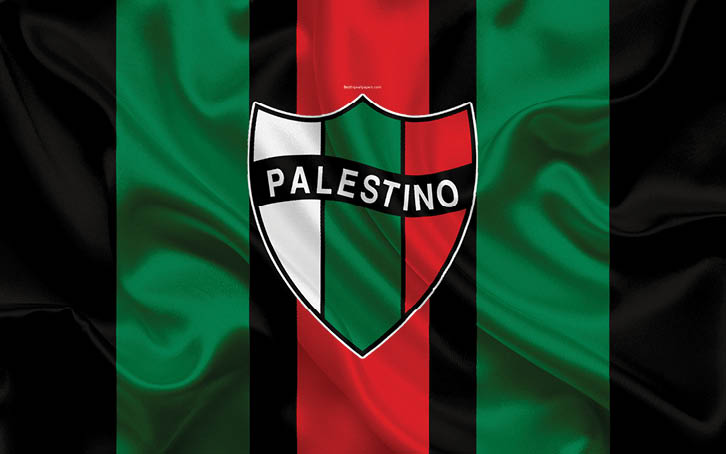
The Club Deportivo Palestino continued to develop, and the seventies proved to be the most successful years of its existence. In 1974, during its first year of being managed by Caupolicán Peña (who remained its manager until 1980), Palestino won third place in the Liguilla at the Huachipato Championship. The following year, Palestino came in fifth in the national tournament and won the Chile Cup as well as the 1975 Liguilla Pre-Libertadores, qualifying for the 1976 Copa Libertadores (the most prestigious regional competition for Latin America’s best football teams). With Elias Figueroa on board, Palestino won the Chile Cup and the 1977 Liguilla Pre-Libertadores, which qualified the club to participate in the 1978 Copa Libertadores. Palestino then went on to beat Sao Paulo FC (then the Brazilian champion) with a score of 2–1.
On November 22, 1978, the club won the 1978 Official Tournament after defeating Colo-Colo 3–1. Most of the club’s players were members of national teams and core members of the Chilean team that won the sub-championship in the 1979 Copa America. Obtaining the 1978 title meant qualifying for the 1979 Copa Libertadores, in which they reached the semifinals but lost to the champion, Olimpia of Paraguay. From 1979 until 1985, the club did not score great results, other than participating in the final group of the Copa Polla Gol 1983; but they lost on the final day against Universidad Católica.
In 1986, Palestino and Colo Colo tied in points for the national championship, and a definition match was played at the National Stadium of Chile on January 28, 1987. Palestino lost 2–0, and Colo Colo won the championship.
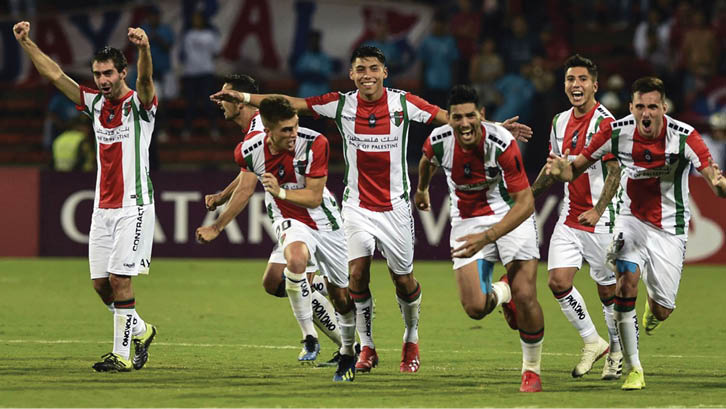
In 1988, after a disastrous season, Palestino fell back to the Second Division and a new board of directors was appointed, headed by Fernando Lama, who managed to get the club back to the First Division league in less than a year. In addition, the Municipal Stadium of La Cisterna was inaugurated, the place where the club remains to this day.
Between July 1977 and September 12, 1978, Palestino was on a winning streak with 44 unbeaten games. It is the longest winning streak in the history of Chilean football.
In the early 1990s, Palestino did rather well and was among the five best teams in Chile. The players that stood out during these years include Aníbal González, who was the goal scorer in the 1995 championship, and midfielder Jaime Valdés, who was the figure and goal scorer of the team in 1999, which earned him a transfer to the Italian football league at the end of that season. Other outstanding players were the Chilean national team players Miguel Ángel Castillo, Agustín Salvatierra, Óscar Lee Chong, Eros Pérez, Patricio Neira, Jaime Rubilar, Yerko Darlic, and Fernando López, as well as the Argentinean players Roberto García and Marcelo Ledesma.
The arrival of the new millennium brought achievements for Palestino along with some unfortunate setbacks. In the first three years of the new millennium, 2000–2003, the club had excellent seasons. In 2005, however, Palestino went bankrupt and was bought by prominent Palestinian families in Chile who gave it a big push. At first, the situation was difficult since Palestino was at risk of losing its qualifications due to bad managerial decisions and practices. But in 2008, Club Deportivo Palestino managed to reach the final of the Closing Tournament, only to lose to Colo Colo (the most successful and highly celebrated Chilean club).
In fact, the story of Club Deportivo Palestino surviving bankruptcy and coming back to life only serves to show the true spirit of Palestinians who can stand in solidarity with each other in order to overcome challenging circumstances and build resilience for the future.
In 2014, Palestino won the Pre-Libertadores group as undefeated, beating Huachipato 6–1 overall and the Santiago Wanderers 9–2 overall. This was the third group won by the club, allowing it to return after 36 years to the Copa Libertadores de America.
In 2015, and in their re-debut in the Libertadores Cup, Palestino faced Nacional of Uruguay in the preliminary round. They won 1–0 in Santiago and lost 2–1 in Uruguay. But thanks to the goal scored in Uruguay, Palestino reached the group stage in which they faced the Montevideo Wanderers of Uruguay, Zamora of Venezuela, and the historic Boca Juniors of Argentina. Unfortunately, however, the team was not able to move on to the next round after losing to Boca Juniors as visitors, thus ending their participation in the 2015 Copa Libertadores de America.
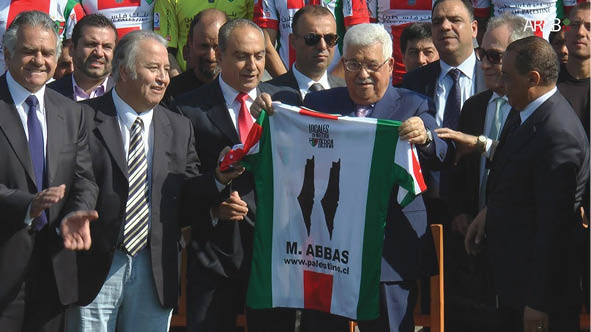
In 2014–2015, Palestino reached the final round of the Chilean MTS Cup, which was played as a single match at the Bicentennial Stadium of Talca, losing to the University of Concepcion 3–2. When Nicolás Córdova replaced Pablo Guede, he started spectacularly, winning four of the first five games in addition to scoring a draw. Although the remarkable start was followed by several ups and downs throughout the competition, Palestino managed to end the championship by defeating San Marcos de Arica 2–3 and qualifying for the 2016 South American Cup for the first time in its history.
In 2017, the club had a bad season, fighting in the relegation positions. In the Transition 2017 tournament, the club fought hard with Curicó Unido and the Santiago Wanderers not to be relegated. On the last day, Palestino faced its direct rival in the relegation, the Santiago Wanderers, who at that time were entering the promotion for the relegation. After an exciting match, the result was 0–0, and Palestino kept its category.
Club Deportivo Palestino is highly esteemed by and considered the pride and joy of football fans in the various corners of the Palestinian diaspora and in occupied Palestine itself. The goals are heard from Santiago to Jerusalem and represent an oppressed people’s cry for dignity.
In 2018, Palestino was crowned the undefeated champion of the Chile Cup, a great achievement after 40 years without major titles. Celebrating the Chile Cup victory, the president of Palestine, Mahmoud Abbas, wrote in November 2018: “The victory of Palestino has brought great happiness to our people. (…) Palestino represents our great nation and its just cause for freedom, justice, and peace. Palestino, like our national team, represents all Palestinians… The steadfastness of our people, both in the homeland and in the diaspora, has shown that Palestine exists. Palestino is much more than just a football team.”
There is no doubt that Deportivo Palestino is more than a football club. In 2014 in Chile, Palestino was confronted with a conflict over the superimposition of a map of historic Palestine on their shirts that replaced the number one. The Jewish community protested through the leaders of Ñublense, even asking for disaffiliation. Palestino ended up paying a monetary fine. But the cause is more than a number or a map. After this episode, the sale of T-shirts multiplied, as did the interest in the subject and the sympathy of a large sector of the non-Palestinian population. Many fans from other clubs are displaying flags in solidarity with the Palestinian cause.
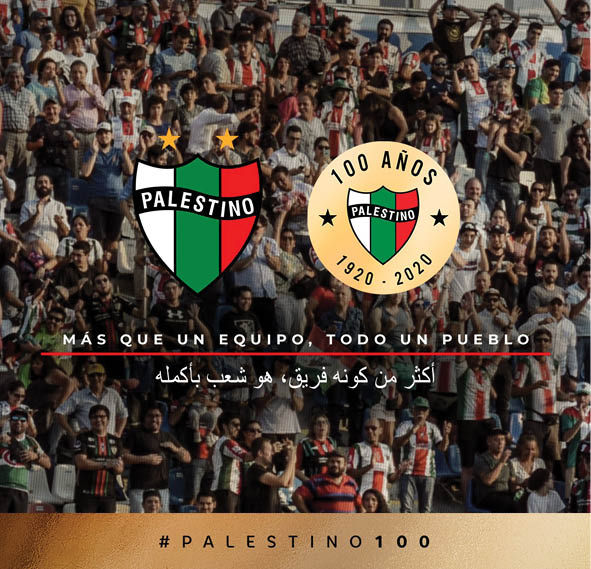
The link, however, is not limited to support from a distance. In fact, several Chilean players who have played on the team have chosen to play for the national team of Palestine. In addition, the team has traveled from Chile to Palestine on sports tours in which they were received enthusiastically by their Palestinian compatriots. And the other way around, too: in 2018 President Abbas visited La Cisterna Stadium, the home of the Palestino, during a trip he made to Latin America.
The connection with Palestine is not new, however. Its historic founders saw in the club a way to keep Palestinian identity alive in the face of attempts to suppress it. And so, after the partition of Palestine in 1947 and its subsequent Nakba (disaster in Arabic) in 1948, which meant the dispossession of Palestinian territory, the idea was born to turn the club into a professional team, because its existence was no longer just a matter of football but rather a way of exporting Palestinian uniqueness, resilience, and excellence to the world.


